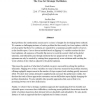Free Online Productivity Tools
i2Speak
i2Symbol
i2OCR
iTex2Img
iWeb2Print
iWeb2Shot
i2Type
iPdf2Split
iPdf2Merge
i2Bopomofo
i2Arabic
i2Style
i2Image
i2PDF
iLatex2Rtf
Sci2ools
120
Voted
ANOR
2011
2011
The case for strategic oscillation
Hard problems for metaheuristic search can be a source of insight for developing better methods. We examine a challenging instance of such a problem that has exactly two local optima, with the novel property that these two solutions are separated by a maximum possible number of moves in the feasible space. Once a descent method based on flipping 0-1 variables reaches the first local optimum, all sequences of feasible flip moves to reach the second, which is the global optimum, must ultimately pass through solutions that are progressively worse. The global optimum can only be reached by visiting these progressively worse solutions until reaching the worst solution of all, which is adjacent to the global optimum. This raises the question of what kind of method can prove successful in solving this problem efficiently. Flipping two or three variables at a time is likewise stymied by the problem structure, offering negligible improvement in the number of steps required, and entailing great...
Related Content
| Added | 12 May 2011 |
| Updated | 12 May 2011 |
| Type | Journal |
| Year | 2011 |
| Where | ANOR |
| Authors | Fred Glover, Jin-Kao Hao |
Comments (0)

